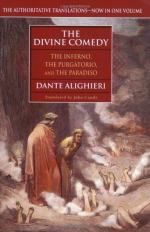|
|
The Inferno Author/Context
Dante Alighieri was born in 1265 in the city of Florence. He was born into an important family and received a broad education, enabling him to marry into the aristocratic Donati family, although he loved another woman named Beatrice. In 1293, he published Vita Nuova, in which he described his tragic love for her. He began participating in politics by the age of thirty and was elected to Florence’s most powerful administrative council at the age of thirty-five. At that time, Florentine politics was characterized by bitter strife between the Blacks and the Whites, two factions of Guelf political party. The Italian nation was split between the Guelf party, who theoretically supported Papal supremacy, and the Ghibellines, who backed the Emperor. The city of Florence had been dominated by the Guelfs since before Dante was born, but recently had been division along the lines of wealth. The Blacks were the relatively poor former feudal aristocracy and generally sided with the Pope. The Whites were made up of the new rich class who demanded municipal independence. During Dante’s term in the administrative council of Florence, a civil uprising between the two parties occurred caused by an attempt of Pope Boniface VIII to bring Florence under his power. The council voted to banish the leaders of both parties from Florence, but Dante was torn in his allegiance, being a close friend of Guido Cavalcante a leading White and married into the Donati family, foremost among the Blacks. Dante was sent to attempt a reconciliation with the Pope, but during his absence the Pope convinced Florence to accept a mediator, the brother of Philip IV of France. When he and his troops were let into the city, he immediately turned all power over to the Blacks. This precipitated Dante’s exile from Florence and indirectly much of the inspiration for the Divine Comedy, which he wrote in exile. He spent the rest of his life writing and lecturing in different Italian cities, dying of a sudden illness in 1321.
The Divine Comedy is known as one of the greatest poetic works in history. In it Dante masterfully combined religious, political, and philosophical themes and expressed them in his vernacular Florentine tongue marking the birth of modern Italian. In medieval Italy, a comedy was simply a tale that progressed from an unhappy beginning to a happy conclusion. However, it was also a lower form of art than the tragedy. With the Divine Comedy Dante challenged these strict ideas of art and the idea that only common literature could be written in the vernacular. He addressed the most universal of moral themes and the most controversial political issues of the time using a mixture of grandiose and vulgar expression. This unification of diverse styles and themes is what has made the Comedy a timeless masterpiece.
Bibliography
Alighieri, Dante. The Divine Comedy. New York: Vintage Books, 1950.
Alighieri, Dante. The Inferno of Dante Alighieri. New York: Vintage Books, 1998.
Bloom, Harold. Dante. Philadelphia: Chelsea House Publishers, 2001.




